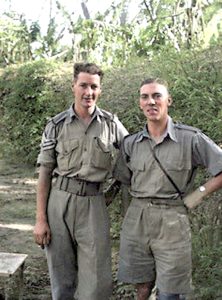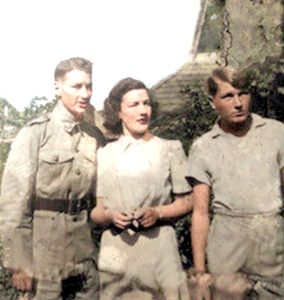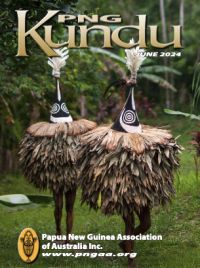Honouring Max
Part One
Max Macgowan & John May, Rabaul, 1941
Tempe Macgowan (TM) & Marian May (MM)
This article was co-written by Tempe Macgowan and Marian May, honouring the life of Max Macgowan, one of the 1,054 prisoners who lost their lives on the Montevideo Maru in 1942. This story also celebrates the friendship between Marian’s father, Padre John Lovette May, and Tempe’s uncle, Max Macgowan who perished at age twenty-six.
MM: Sergeant Maxwell Harcourt Glover Macgowan, VX14699, and my dad, Padre John Lovett May, TX6004, became mates in Rabaul in 1941. The padre’s role was to maintain morale and provide diversions for the troops, and Max looked out for the padre. In 1992, after revisiting Rabaul with a Lark Force party, Dad spoke with tears in his eyes of his friend, who died on the Montevideo Maru.
As Dad got older, Mum tried to track down Max’s family, with only the old St Kilda address, and the names of Max’s mother, Mollie, and fiancée, Joyce Williams. The trigger for my search came from a visit to Hobart in 2022, when I met Claire, the daughter of Dad’s long-time girlfriend, Charlotte (‘Lot’). Lot had long since died, but a trunk in Claire’s garage contained her papers, including undiscovered letters and photos from Max and John.
The letters to Lot revealed more about Max than those written to Dad’s parents. Hearing Max’s voice through his writing was unbelievably moving. Surely Max’s family should have this information about the time before his tragic death. I decided to make a last attempt at finding a family connection through Ancestry.com.
The six or so Ancestry family trees noted only that Max died at sea as a POW on the Montevideo Maru in the South China Sea, on 1 July 1942; the information was recorded by official sources. Not feeling very optimistic, I contacted the family tree owners. Replies came back quickly from four. Most promising was a call from Laura Bennett who told me that Max’s grandmother and her grandmother were sisters; she thought that she might have contact details for Max’s niece.
I’d found Tempe!
TM: One Friday evening in July 2022, I received an unexpected text. It was from Laura Biffin, née Bennett, the granddaughter of our dad’s cousin, Margaret Helen Beatrice Tulacko née Macgowan. The text read in part:
…she [Marian May] found that I was a relative of Maxwell Harcourt Macgowan. Her father was his good friend and they served together in Rabaul (PNG) 1941–1942. She has letters and photographs she is hoping to give to someone in Maxwell’s family. I felt that there may be a closer relative for her to pass on these lovely historical memories.
Little information had been passed on about what had happened to Max except something from our Aunt Shiela, Max’s sister. My recollection of what she said was that he was shot down in a hospital ship off PNG. As it happens, in October 2019, some friends and I were visiting PNG and went to several war cemeteries including the one at Kokopo where there is a memorial to Montevideo Maru. It was such a sad yet gratifying experience to see his name on the plaque. There was a connection there despite the time-lapse.
From that one text from Laura, expressing Marian May’s generosity and goodwill, a wonderful new connection has evolved. It embraces not just the two soldiers, but the broader Macgowan family. MM: In July 1941, John wrote:
There is a sergeant here, a cousin of the Macgowans in Hobart. (The Hobart man was a doctor—or is, for all I know—and Ian, his son, was at Hutchins.) This chap is Max, aged 25, and a very decent type of chap. He has been dropping in quite often. One day this week we took some photos of frangipani.
From then on, Max figures in most letters. They played table tennis, bridge, billiards, and snooker, saw films at the local theatre, shared cakes, and shortbread, from food parcels, and spent many evenings yarning and visiting the New Guinea Club.
In August John wrote to Lot:
Max is quickly becoming a friend … I realize that I have missed having a friend among so many good acquaintances.
Max, like John, enjoyed music, and they made use of the piano housed in the padres’ tent:
Max is very keen [on] things like the Messiah and the Elijah, having been a choir boy, & as I’ve pinched a couple of copies from St George’s (on loan!) we’ve had some good sessions. He has a fair baritone with a good range.
An important event, particularly in retrospect, was the ‘photoshoot’ on 13 September when Max and John ‘… ran off a film on ourselves’ in the grounds of St George’s Anglican Church, where John was acting rector in addition to his military role. The photos taken of Max may be his last; Max took the best-ever photo of Dad.
Later in September 1941, Max added to the middle of John’s letter to Lot:
Lot! This man here again. I’ve just arrived in after quite a night of snooker and a few – liquids of course and found John hard at it – Don’t take any notice of me … but as you’re almost a pal of mine I just couldn’t refuse the chance and must say How dee and all that. Regards – chin up – Max.
In a separate letter to Lot, who was running National Fitness camps from Sydney, Max wrote:
…we are building up a good friendship which I for one hope will last, as he is a good refuge in a camp such as this. You seem to have lots to do with camps, but Army ones would break your heart.
John wrote on 23 September:
… Max, who is an instructor in a bullring—a ‘school’ [for tutorial work]—has just come in, and we are to have a session of letter-writing …. The plane came in, dead on time … and we are all at the peak of excitement awaiting mail. The morale of the place has just about jumped through the roof … Max often drops in—awfully decent chap—very fond of him.
In October John planned a much-needed day away in the parish car for Max and a fellow Tasmanian:
It should be a good break. The other two … need one. Max is having a busy week as his company is responsible for all camp duties, and that means that he is kept on the go. Max unfortunately drove a truck in an emergency—and caught a bit of trouble—he is, like me, not supposed to drive except in (such) an emergency—he has been refused leave for Saturday, so the trip may not come off….
A few days later Max wrote a three-page letter in reply to a note from Lot:
I am at present in a place the name of which I can’t use … for the purpose of a rest … spine drill all day. They are trying to cure me of a flash of minor ailments which have beset me in diverse places tho’ by themselves they are very petty but altogether they become annoying. … I have had all my life a desire to keep fit but find that in this climate it’s darned near impossible. … Has John told you I have a wonderful girl. If he hasn’t, I’ve failed miserably because she’s simply grand & will the four of us have times when things settle down again…. Well, I hope this isn’t too impertinent & also that you can read it – Regards, Max
John describes Max to Lot:
Max is very much like R— C—, a little impetuous, fond of doing things, restless, still intolerant, very much in love; but he is a R— more mature; and … we seem to have struck some kind of affinity.
On John’s birthday on 1 November, the two men celebrated:
…Max and I went off by ourselves and dined at the N.G.C. After kaikai we played snooker, then, in a wild mood, hopped into the car and did the deck-chair trip. It was brilliant moonlight, and we just hummed pleasantly along the road and watched the sea. The moon was right overhead, so there were no moonpaths, but the night was soft and still and I loved getting out into the calmness.
Late in the year, the pressure of work and life in the tropics were affecting Max’s health:
Max … is by no means well, as he has had a nasty run of ulcers and tinea … and it seems that he is generally run down. …he’s the only sergeant in his coy. at present, the others being out on duty or in hospital.
To Charlotte (Lot), John added:
… the M.O. has put him on to sulfanilamide tablets and he is as dopy and out-of-sorts as a seasick drunkard … [he] should be fit—really fit—in a short time…
Because Max was ‘scarcely capable’, John wrote his letters for him, asking Lot and his parents to drop Max a line. To call it quits, when John was rushed, Max finished some letters for him so as not to miss the mail plane.
With the looming invasion, life became more tense. On 3 January 1942, Max, John, and others celebrated a birthday at the club, telling Lot how they let off steam:
…we talked, sang and shattered the still night with raucous abandon. It was great fun. We derived not a little help from Abbot’s beer, sherry and liqueurs, in generous quantities, and finally left the place rather later than any of us intended and also later than any of the leave passes had provided. That, however, didn’t trouble us one little bit. It was just plain fun and games …. repartee & priceless remarks ebbed & flowed as freely as the tides of beer. It would have rejoiced your heart to see us. When we broke up … a bit of reaction set in. … The moon was brilliant. The hills, the stars, the pure velvet of the sky … the water — it was too much.
John’s last letter to his parents before the mail ceased was dated 15 January 1942:
Max is now in hospital. He went in yesterday, as his tinea is showing no signs of improving. Perhaps now he may have a good rest, and so get rid of it. … He’s an awfully nice chap… I think he’ll be in hospital for a couple of weeks at least … I do hope you may be able to scribble him a note, now that he’s in hospital. It would cheer him up a lot.
On 22 January, the day before the invasion, the 90 or so patients, including Max, were moved some 20 miles from the military hospital in Rabaul, taking over the Boys’ Hospital on the slope above Kokopo, run by the Sacred Heart Mission at Vunapope. Some of the more fit patients escaped into the jungle with the fleeing troops. In action, a padre’s place is at the hospital and, as the most senior officer remaining, John surrendered the hospital when the Japanese came up the slope the next morning.




